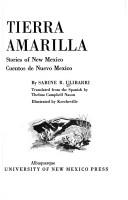Que Pronto Pasen Los Años: A Look Back at Chicano(a) Literature
1971 (part 1)
Share
Republished in 1978 and in Luis Valdez Early Works: Actos, Bernabe and Pensamiento Serpentino
on Arte Publico Press in 1990.
Blessing From Above
1971 (part 1)
Share
Tierra Amarilla: Stories of New Mexico/Cuentos de Nuevo México
Sabine R. Ulibarrí
University Of New Mexico Press [1971]These five bilingual tales and one novella evoke the rural life of Tierra Amarilla, a village in northern New Mexico where the author grew up. Ulibarrí weaves mystery and sympathy into his stories of carefully drawn characters who can be cruel, eccentric, hilarious, and unforgettable.
First published in 1964, these enduring stories were translated for the first edition of this book in 1971. In the introduction to the present edition, literary critic Erlinda Gonzales-Berry writes that Ulibarrí’s work has long taken part in Hispano literary resistance by refusing to let traditions be forgotten.
Delightful reading for anyone interested in the hues of Hispano life in northern New Mexico.
First published in Spansih in 1964, this was the first English translation.
Republished in 1978 and 1993.
Republished in 1978 and 1993.
Luis Valdez (Author), El Teatro Campesino (Author)
Cucaracha Press Fresno (1971) This collection is actually three books in one: 1) a collection of one-act plays by the famous farmwork theatre, El Teatro Campesino and its director, Luis Valdez,
Republished in 1978 and in Luis Valdez Early Works: Actos, Bernabe and Pensamiento Serpentino
on Arte Publico Press in 1990.
Blessing From Above
Arthur Tenorio
"Blessing appears to have been self-published. According to the title page, the novel was published by the West Las Vegas Schools’ Press in 1971. Both novels do contain anBlessing centers around the alien “Nifty” who is “found” in the bush in Africa by two missionaries, taken in and raised and educated by the Wellsons. When they are posted to a new mission, they take their “son” to a friend in Jocunda, the capital city of the fictional country Morunda. Morunda is struggling with
agricultural and economic development, though once Nifty arrives and begins working for a government agency, each of its crises are “solved” by Nifty, though he never takes credit. Eventually, Morunda becomes a global model for development, and the aliens come down to Earth to make their presence known. They decide, in the end, to withdraw and continue to monitor Earth since we are not yet ready to join the larger community...scientifically- and politically-advanced aliens attempt to interact with humans. While in Blessing, the alien Nifty assumes a physical form — like an incarnation or avatar from the god-like aliens...the interaction remains at an abstract level."
--- Rich Calvin, "Isabella Ríos and Victuum: Speculating a Chicana Identity"










No comments:
Post a Comment